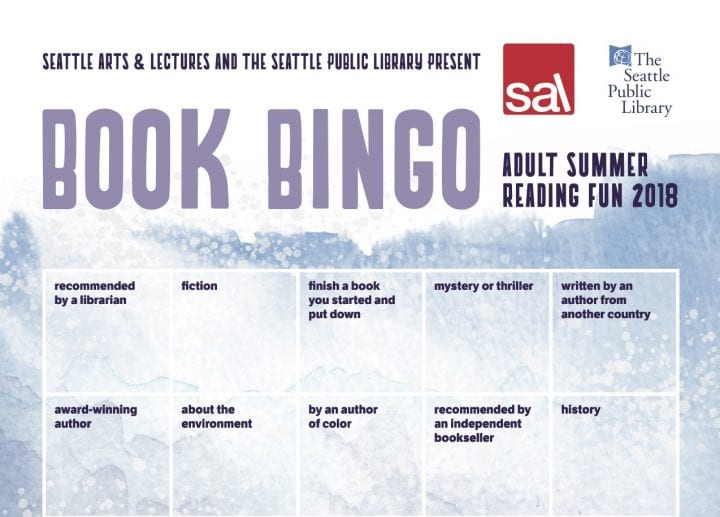
Summer Book Bingo: First in a Series
August 8, 2018
Wondering how to fill your “First in a Series” square for Summer Book Bingo? In this piece, featuring Elena Ferrante, Haruki Murakami, and more, local writer Julia Cook proves that you don’t have to re-enroll at Hogwarts School of Witchcraft and Wizardry to get sucked into a great series this summer.
Still need your bingo board? Download the adult version here, and the kids’ version here.
By Julia Cook
What comes to mind when you hear the word ‘series’—a half-full bookshelf of dusty hardbacks, some unfamiliar maps on an inside cover, midnight release parties crammed with costumed teenagers? Over half of the top 25 best selling series incorporate some form of fantasy (and yes, 50 Shades makes the list), but long before the supernatural spawned books, movies and fan fiction, stories of everyday life were serialized in periodicals around the world. A Tale of Two Cities, The Adventures of Tom Sawyer and other now-classic novels first appeared in this form to cut down on publishing costs. Following these sagas of society was a popular form of entertainment from the Victorian period on, and thus, the modern novel was born.
Of course, tales of the everyman didn’t stop with Dickens and Twain. Serialization often serves to lengthen a work—prolonging the fates of our favorite characters in the process. So even if you’re done with dragons and had your fill of fairy tales, don’t pass on this square. These five First in a Series offer a contemporary slice of life without the witchcraft and wizardry.
Armistead Maupin’s Tales of the City follows the occupants of 28 Barbary Lane as they navigate relationship woes, career developments and the AIDS epidemic in 1980s San Francisco. First serialized in The San Francisco Chronicle and told from multiple viewpoints, it’s considered the first work of fiction to capture the inner lives of LGBTQIA+ Americans. (Who knew cruising at Safeway was a thing?) Book 1 introduces Mary Ann Singleton, a goody two shoes from Cleveland who lucks into an unconventional family of friends and gets involved with her unhappily married boss. Like Scandal for the Tenderloin, this series offers giggle fits and crying jags—frequently on the same page—as well as characters who grow with you, however long you choose to read.
Rabbit Run by John Updike is what happens when you never leave Cleveland—or Brewer, Pennsylvania. Disgusted with his textbook 1950s existence, Harry “Rabbit” Angstrom abandons his job, drives to West Virginia and back, takes up with a prostitute, and tries to convince himself he deserves better than the life he’s led. What’s funny—and tragic, depending on if you like the guy—is that the life Rabbit builds in his weeks away from home looks terribly similar to the one he left behind. Much like Yates’ Revolutionary Road, Updike’s novel treats the idea of a white picket fence like a prison of matchsticks ready to combust. If you can get through the uncomfortable sex scenes (like American Psycho without the knives), this book offers a glimpse into the decade of discontent that gave us the 1960s.
My Brilliant Friend, the start of Elena Ferrante’s four Neapolitan novels, describes in vivid detail the difficulty of growing up poor and female in 1950s Italy. Through the continued betrayals of the men in their lives, a lack of support from their families and their often fruitless pursuit of an education, Elena and Lila create a friendship that—despite its jealousies—transcends the difficulties they face. Like Tales of the City, this is a work whose characters will constantly surprise you, for better or for worse.
Reading Wind/Pinball, a set of Haruki Murakami’s first two novels in the Rat trilogy, is a unique opportunity to witness his development as a writer in the 1980s. His unnamed narrator moves through life with an apathetic, and at times sardonic attitude, even after a woman he’d dated commits suicide on summer vacation. Fans of Norwegian Wood and Colorless Tsukuru Tazaki will appreciate Murakami’s stark language and anecdotal storytelling style. And for those looking to fulfill their Author from Another Country square, Murakami’s urban realism makes everyday Japanese life accessible and even familiar, even if you’ve never ventured East.
Rachel Cusk wrapped her Outline trilogy this year with the release of Kudos, which, like Murakami’s Rat novels, shows the striving and often thankless side of being a professional writer. We learn precious little about narrator Faye in these three books, but from her tone and the people she surrounds herself with, it’s clear that she’s miserable. But one mark of Cusk’s talent is that these books are anything but miserable to read. Through conversations with strangers and casual acquaintances, Faye learns literal volumes about human nature and the choices we make, often not because they’re right, but because they’re easy. Read Outline and you’ll wonder what face you’re presenting to the world, and whether you’d like what we see.
Each of these novels raise questions about how we live our lives, but they also present solutions for your Summer Book Bingo board. Read another Tales of the City book for LGBTQIA Author or Character, Rabbit is Rich for Prize Winning Author, and The Story of a New Name or Kudos for About Travel or Read While Traveling. Who knows what you’ll learn of yourself in the process.
Julia Cook is a three-time blackout boarder in SAL’s Summer Book Bingo, though her high school reading list is still marked ‘incomplete.’ Pitching her favorite publications with a similar fervor, she’s found success with The Stranger, Bitter Southerner, and Pittsburgh City Paper, but not GQ… yet. Check out her other book notes for SAL, including an expatriate packing list, a webcomic, and this ode to our National Parks.